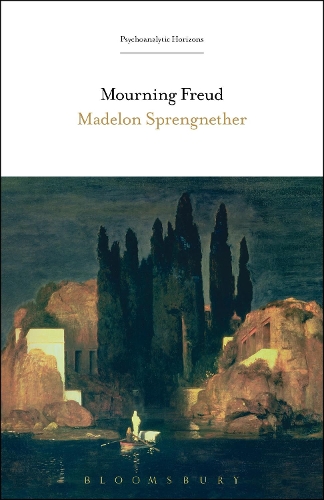
Mourning Freud
(Hardback)
Available Formats
Publishing Details
Mourning Freud
By (Author) Professor Madelon Sprengnether
Bloomsbury Publishing PLC
Bloomsbury Academic USA
8th February 2018
United States
Classifications
Tertiary Education
Non Fiction
Psychoanalytical and Freudian psychology
150.1952092
Physical Properties
Hardback
286
Width 140mm, Height 216mm
481g
Description
Mourning Freud analyses Freuds experiences and theories of mourning as the basis for exploring changes in psychoanalytic theories and practices over the course of the 20th century. The modernist Freud of the early 20th century has ceded to the postmodern Freud of the 21st. Madelon Sprengnether examines this phenomenon from the perspective of Freuds self-analysis in relation to his generation of theory, the challenges and transformations wrought by feminism, cultural studies and postmodernism, and the speculations of contemporary neuroscience concerning the unreliability of memory. She offers a significant interpretation of major biographical episodes in Freuds life, arguing that Freuds inability to mourn the losses of his early life shaped his theories of mourning, which in turn opened the field of pre-oedipal studies to his successors, enabling a host of new psychoanalytic theories such as object relations, intersubjective and countertransference theories, Lacanian analysis, and trauma theory. Many of these approaches converge on the formulation of mourning as critical to the process of ego development. Through this argument, Sprengnether traces the shift from modernism to postmodernismfrom an emphasis on mastery to vulnerability, from vertical to horizontal systems of meaning-making, and from what is representable in words to the realm of the nonverbal. Mourning Freud, by exploring Freuds own struggles with mourning, allows us, in turn, to mourn himreleasing him from frozen idealization while demonstrating the relevance of his work to the 21st century.
Reviews
Neither a Freud idealizer nor a Freud basher, Sprengnether offers an intriguing discussion of one of the major areas of psychoanalytic theory ... Sprengnether is well qualified to undertake this ambitious project Sprengnether, well versed in psychoanalysis, deconstructionism, and feminism, brings to Freudian studies an uncommon knowledge of high theory and a notable capacity for close reading ... [A] valuable addition to the vast scholarship on a man who continues to disturb the worlds peace. The scholarly footnotes are fascinating, revealing not only Sprengnethers erudition but also her generosity in paying tribute to scholars who have influenced her thinking. -- Jeffrey Berman * Journal of the American Psychoanalytic Association (JAPA) *
Mourning Freud is an important intervention in discussions of psychoanalysis, literature and feminism. The product of a quarter-century of careful and deep thought by a prominent literary and academic figure, it delivers a set of beautifully written analyses of the relationship between psychoanalysis and social issues, mediated through the motif of mourning. In this book, Madelon Sprengnether offers a delicate and immersive experience of rethinking Freudian and post-Freudian theories of intimacy and loss. * Stephen Frosh, Professor of Psychosocial Studies, Birkbeck, University of London, UK *
Mourning Freud is a beautifully written book in which Sprengnether respectfully, intelligently develops penetrating critiques of Freuds workparticularly in the areas of pre-Oedipal development, mourning, and female psychologynot for the purpose of dismissing Freud, but for the purpose of revising and extending some of his most pivotal ideas. This is a book that leaves the reader feeling that he or she has not simply listened to a writer in the act of thinking; instead, the reader feels that he or she has had the privilege of taking part in a remarkable conversation. * Thomas Ogden, psychoanalyst and author of Reclaiming Unlived Life: Experiences in Psychoanalysis (2016) *
Madelon Sprengnethers The Spectral Mother was one of the essential texts to grow out of the fruitful intersection of feminism, literary theory and psychoanalysis. In this collection of essays, Mourning Freud, she has made another important contribution to the psychoanalytic theory of culture. Sprengnether is to be congratulated for deploying her mastery of the pre-Oedipal turn in psychoanalysis, trauma theory, Freud studies, and neuropsychology to properly mourn Freudto transform him from 'a ghost into an ancestor.' In so doing, she has not only advanced psychoanalytic discourse beyond the infantile polemics of the Freud Wars, but also helped us to form a more mature picture of the first psychoanalyst as well as of ourselves. * Joel Whitebook, Faculty, Center for Psychoanalytic Training and Research, Columbia University, USA, and author of Freud: An Intellectual Biography *
An odyssey of scholarship, Mourning Freud is a beautifully written book. Sprengnether is clear-eyed and compelling. * Anthony Elliott, Dean of External Engagement, University of South Australia *
An important contribution to the recent rethinking on Freudian theoretical concerns, including the place of the literary within theoretical formulations, the relation of the biographical to the analytic, and the possibilities of recasting certain concepts in light of developments in the field since Freud. The essays are part homage and part critique, and must be read as a sustained rethinking of some of the intellectual fulcrum points by which the critics of Freudian theory have positioned their revisions The book is best suited to scholars addressing Freudian themes. Summing Up: Recommended. * CHOICE *
Author Bio
Madelon Sprengnether is a poet, memoirist, and literary critic, and Regents Professor Emerita of English at the University of Minnesota, USA. She has published numerous books in the field of feminist, psychoanalytic criticism and theory, including The (M)other Tongue: Essays in Feminist Psychoanalytic Interpretation (1985) and the pathbreaking The Spectral Mother: Freud, Feminism and Psychoanalysis (1990). In addition to her academic publishing, she is the author of several books of poetry and memoir, the latest of which, titled Great River Road (2015), views the process of memoir writing through the lens of contemporary neuroscience. She also blogs for Psychology Today.
